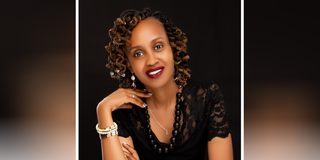Meet Eva Makandi, Kenyan feted at global stage for leading climate conservation

Eva Makandi, founder of Light on a Hill Organization (LOAH). She has been honoured by Global Landscapes Forum for leading the charge against climate and biodiversity crises.
Kenya’s Eva Makandi, founder of Light on a Hill Organization (LOAH), has been recognised as one of 16 women leading the charge against climate and biodiversity crises.
The Global Landscapes Forum (GLF) honoured Ms Makandi, 29, along with the other women, on International Women's Day.
Speaking to the Nation.Africa, Ms Makandi said she was humbled that her work is seen and appreciated globally.
"I truly feel humbled and encouraged that my efforts are seen and appreciated globally. It gives me more motivation to grow and continue with my conservation and restorative efforts," she said.
GLF is a platform that brings together people and organisations to discuss and work towards sustainable land use and development, with a focus on forest and landscape restoration, sustainable agriculture, climate change, and biodiversity conservation.
According to GLF, the 16 women are the faces of innovation in science, technology, art, public policy, sustainable business, environmental activism, journalism, litigation, climate finance, international climate treaty negotiations, and grassroots ecosystem restoration across the globe.
Ms Makandi's LOAH, which she started in 2020, focuses on environmental conservation and restoration, education, and talent development. LOAH aims to conserve and restore Ms Makandi's community in Meru County, which has degraded significantly over the past 15 years.
“Having worked as a community developer for other communities in the country, I had the burden for the longest time to be a catalyst to some of the socio-economic challenges I had been observing in my village, Kiirua-Meru," said Ms Makandi.
Kenya has been experiencing the impacts of climate change in various ways. Climate change has caused changes in temperature, rainfall patterns, and weather events, leading to more frequent and severe droughts, floods, and other extreme weather events.
These impacts have had significant consequences for the country's agricultural sector, food security, water resources, and ecosystems.
"Climate change has hit us hard as a community, especially based on the fact that we rely on agriculture as our main source of livelihood," added Ms Makandi.
The organization initially focused on tree planting, planting 728 trees by March 2022, but later shifted its efforts towards education and mentorship after realising the significant knowledge gap in conservation and restoration.
"Until now, we have managed to mentor 234 children (5–14 years old), and we still keep on mentoring and sharing with them. We have also had, from the group, 20 very passionate peer mentors. We have established an organic vegetable garden enabled by Kenya's environmental action network. We’ve incorporated appropriate technology in agriculture, from which we partnered with our friend Rose and taught the children how to establish a vertical garden that is space efficient and makes kitchen gardening even easier. We’ve established an eco-friendly, constructed classroom that facilitates," she added.
Ms Makandi and her team have mentored 234 children aged between 5 and 14 years, and the organisation has established an organic vegetable garden and an eco-friendly classroom that facilitates conservation education.
LOAH has also partnered with the Kenya Environmental Action Network to incorporate appropriate technology in agriculture, establishing a space-efficient vertical garden to make kitchen gardening more accessible.
Ms Makandi, who aspired to become a doctor before deciding to pursue community development, wants to inspire conservation and restoration among children and communities globally.
She plans to work collectively with children, youth, and the communities she will work with and mentor. Ms Makandi's recognition as one of 16 women Restoring the Earth shows that her efforts to conserve and restore her community are recognized and appreciated globally.
"Growing up with a mom who was a nurse, I would say I wanted to become a doctor. Not only until I visited my mom a couple of times in the hospital and realized how scared I was of wounds, especially open ones, and critically ill people. However, after joining secondary school, I automatically felt at home in the Red Cross and hospice clubs. This was extended at the university. By form three, I was certain I wanted to become a humanitarian, and that led me to pursue community development for my undergraduate degree," she added.





